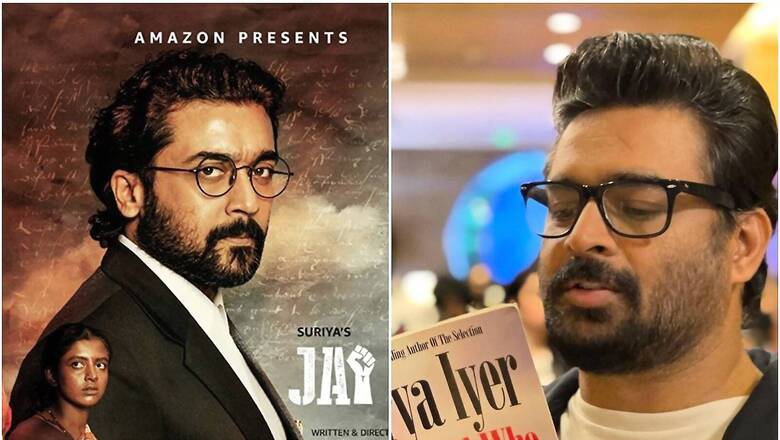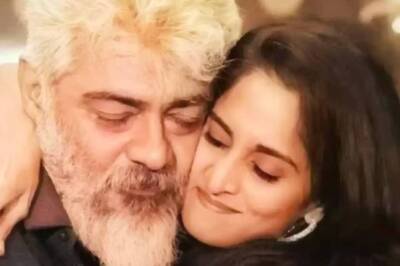
views
The Covid Pandemic still rages as 2021 ends. There is a lot of despair with the new variant, Omicron, having just emerged and gripped most parts of our world. In these rather dark and depressing times, many of us would have taken solace from the thriving OTT platforms which have offered a mind-boggling variety of films and series. The best part is streaming giants like Netflix, Amazon Prime, Disney+ Hotstar, ZEE5, Lionsgate Play and even Apple TV have been competing with one another to present the best. Some of their offerings have been sparkling, and I found it hard to pick the 10 best among them. But here they are.
The Lost Daughter: A great actor will light up even a dull story, though Maggie Gyllenhaal’s directorial debut, The Lost Daughter, is not dull by any means. However, Oscar-winner Olivia Coleman (who won for her role in 2018’s The Favourite) brings her usual powerful presence to the film in which she plays a mother who pines for her grown- up daughters. The director turns Elena Ferrante’s 2008 novel into a warm, almost sensual, narrative with enrapturing details.
The Exam: Tackling examination nerves and an unfeeling patriarchy, Kurdish auteur Shawkat Amin Korki turns his movie, “The Exam,” into a crime caper with all the thrills that go with the genre. The film gives us a lucid look at gender issues, economic inequity and social distress in a region that has seen conflict and intense suffering over many years. The story is set in the eastern city of Sulaymaniyah, and it seems to have taken place around 2017 with the ouster of ISIS from Mosul. We are never shown any war, but are privy to it through radio broadcasts and fleeting conversations.
Mare of Easttown: British actress Kate Winslet has dabbled in period pieces, rom-coms, dramas and everything in between, but in her latest outing in “Mare of Easttown,” she absolutely dazzles as a detective in a small, conservative town in Pennsylvania. In bleak, deprived small-town America, everybody knows everybody and working as a cop is not easy for Winslet’s character Mare Sheehan.
Nomadland: Oscar-nominated actress Frances McDormand plays a disenfranchised widow in “Nomadland,” where she takes to the road in a van after she loses her job in a mine, which shuts down in 2011. The Nevada town that depended on it crumbles, its zip code is binned. Nomadland has clinched several Academy Award nominations, including those for Best Picture, Best Actress, and Best Director for Chloe Zhao. The first Chinese woman auteur with this recognition
The Father: Dementia can be a disaster. It is one of the most scary mental disabilities that mankind has been facing for years.Nothing can be more confounding than forgetting the face of a loved one. Nothing can be confusing than losing one’s way and not being able to get back home. There have been several films about this, but most of them have lost their way, much like their characters, in the middle. Not The Father, which keeps us engaged till the very end. Helmed by French playwright and novelist Florian Zeller, who steps into cinema with The Father (based on his own 2014 play), it is in the running for several Oscars, including Best Picture, Best Actor, etc. Essaying the The Father is no less a giant than Anthony Hopkins, who came into my view in 1991 with his The Silence of the Lambs, portraying the horrific Hannibal Lecter. He won the Best Actor Academy Award. Later, I saw him in Howards End, Shadowlands, The Remains of the Day and most recently in Two Popes (2019). Sir Anthony, a Welshman, takes a completely different path in Zeller’s work. He plays an 80-year-old man, who is fiercely independent – at least he thinks he can be – and has lost his wife and a daughter (in an accident, but he does not know about it). His is merry one moment, and mercurial the other.
Decoupled: Netflix’s latest offering, Decoupled, written by Manu Joseph and helmed by Hardik Mehta, is a no-holds- barred look at Indian society with its blatant hypocrisy and elaborate efforts to hide the warts and moles. About a couple who are on the verge of breaking up, but living under the same roof for the sake of their teenage daughter, the work is a celebration of separation, of their decoupling process. But this forms a mere backdrop, which Joseph uses to spook Indian society, and he does this with a mix of gutsy humour and sarcasm. I wonder whether Decoupled could have made it to the cinemas, given our rigid censor rules. But there you are with a peppy piece of work, a series split into eight episodes or chapters, each with a title. Madhavan, probably in his first ever comedic role, really enlivens the series – sometimes with a deadpan expression, sometimes with a twinkle in his eye. He is really a boy, and there is something disarmingly innocent about him, compared with his wife, Shruti. She takes life way too seriously, and is always at loggerheads with her hubby.
The Power of the Dog: New Zealand director Jane Campion’s The Power of the Dog comes more than a decade after she made Bright Star on the last three years of poet John Keats’ life and his romance with Fanny Brawne. It had a great cast of Ben Wishaw and Abbie Cornish. The director’s latest, The Power of the Dog, which has just opened on Netflix, is a diversion from most of her works in which the protagonist is invariably a woman. It is 1925, and Campion presents an exciting cowboy story, though without guns, bullets and fights. The confrontations are internalised with Phil — played superbly by Benedict Cumberbatch, who is the protagonist here in a deviation from Campion’s women heroes – resentful of a third and fourth person intruding in the brothers’ domestic arrangement. The other brother,George, brings home his wife, Rose (Kirsten Dunst) and her son, Peter (Kodi Smit-McPhee) – leading to conflicting situations.
Jai Bhim: Custodial violence and even deaths are not uncommon in India. We have seen the Baghalapur blindings in 1979-80 when 31 prisoners had acid poured into their eyes. They were maimed for life. It was one the darkest blots on India’s police/judicial system. There have been many other cases of torture and killings (encounters, for instance) by the men in Khaki. Yes, lawyers have fought for the victims and helped redress the heinous wrongs perpetrated by cops. One such was Advocate K Chandru, who went on to become a Madras High Court Judge. One of the cases he handled as a lawyer involving tribal people in a Tamil Nadu village created a huge stir in the police force and the judiciary. The year was 1993, and T.J. Gnanavel’s latest directorial offering on Amazon Prime – Jai Bhim — focuses on this landmark case Chandru fought and won. And the performances are top class. Suriya probably gives his career best as Chandru, who takes up the case of a poor, hapless, pregnant Irula woman, essayed with admirable restraint by Lijomol Jose. As Sengani, she is just brilliant essaying a woman distraught when she finds her husband, Rajakannu (another compelling performance here by K. Manikandan), missing after he had been accused of a jewellery theft and picked up by the police.
The Rapist: Aparna Sen’s latest, The Rapist, is yet another work that is deeply profound, and raises questions about capital punishment. A mindboggling amount of research has been conducted to prove that death sentence does not deter heinous crimes like homicide. A Supreme Court judge in America once said that capital punishment was for those without capital. Indeed. It is the poor and sometimes the racially underprivileged sections of society who often face the noose. Also, The Rapist examines the issue of what is more relevant: heredity or environment. It has been conclusively proved that it is environment that shapes a child’s character. A rapist’s or murderer’s child need not follow in its parents’ footsteps if educated in the right values by the right people. A child may inherit certain diseases like diabetes, but seldom behavioural tendencies if it is allowed to grow up in an atmosphere of love and kindness .
The Mad Women’s Ball: Based on Victoria Mas’ award-winning novel “Le Bal des folles (which is also the French title of the movie) and scriped by Laurent and Chris Deslandes, The Mad Women’s Ball opens in Paris in 1885, and we are transported into the pomp and luxury of an aristocratic family that lives in a palatial mansion. We see young Eugenie (Lou de Laage, who starred in Laurent’s earlier helming effort, Breate ) for the first time – reading a book on spirits. Several scenes later, we see a psychiatric institution, Salpetriere Hospital. Here women found rebellious are confined after being termed mad. The place, run by Dr Jean-Martin Charcot (Grégoire Bonnet) and supervised by Chief Nurse Geneviève (Laurent), also admits those with genuine problems. But it becomes clear that some of the inmates should never have been there in the first place, like for example, Eugenie. She has been admitted to the institution by her stiff aristocratic father when he feels that she has become inconvenient to the family. She is only 26 — radiantly beautiful, extremely intelligent and well read.
Read all the Latest Movies News here


















Comments
0 comment